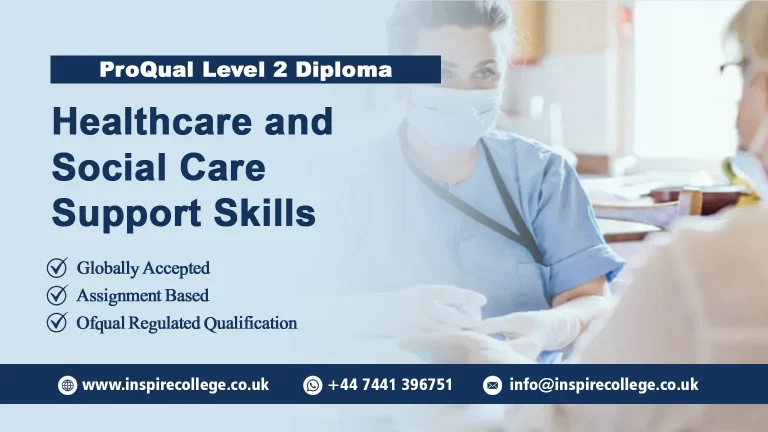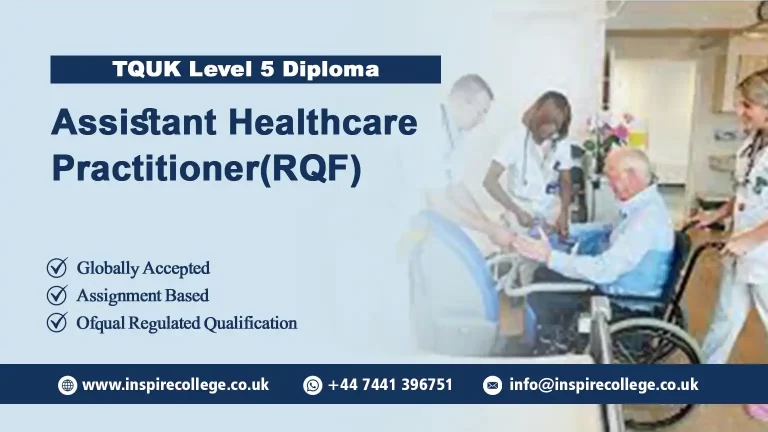
TQUK Level 3 Diploma in Healthcare Support Work
Discover your potential to transform lives with the TQUK Level 3 Diploma in Healthcare Support Work. Crafted with precision, our program is designed to arm you with the expertise, skills, and confidence required for a thriving career in healthcare. Delve into a comprehensive curriculum covering vital subjects such as healthcare sector dynamics, effective communication strategies, stringent health and safety measures, personal development avenues, and specialized healthcare proficiencies. Whether you’re embarking on your healthcare journey or seeking to enhance your existing skill set, our diploma opens doors to diverse career paths in hospitals, clinics, care homes, and community settings.
Endorsed by Training Qualifications UK (TQUK), our diploma carries the mark of excellence and recognition, offering you a competitive advantage in the job market. We understand the importance of flexibility in your learning journey, which is why we provide flexible study options, including online courses and blended learning formats, tailored to accommodate your schedule and preferences. Additionally, our commitment to your success extends beyond graduation, with ongoing career support and guidance to help you navigate the transition into the workforce seamlessly.
Embrace a fulfilling career where your actions have a meaningful impact on the well-being of others. Enroll in the TQUK Level 3 Diploma in Healthcare Support Work today and embark on a journey of professional growth, personal fulfillment, and societal contribution. Seize the opportunity to make a difference – your future in healthcare starts here!
There is no specific entry requirements however the learners should have a minimum of level 2 Literacy and Numeracy or equivalent.
The recommended minimum age for this qualification is 16 years and above.
Mandatory Units
This course contain total of 83 credit hours. The list below contains ALL mandatory units and optional units.
Below that, the available pathways are listed by specialism
.
Manadatory Units
| Sr# | Unit Title | Credit Hours |
|---|---|---|
| 1 | Assist in monitoring the health of individuals affected by health conditions | 2 |
| 2 | Cleaning, Decontamination and Waste Management | 2 |
| 3 | Communicate with individuals about health promotion and wellbeing | 3 |
| 4 | Maintain infection prevention and control in a care setting | 2 |
| 5 | Maintain quality standards in the health sector | 2 |
| 6 | Person-centred practice, choice, and independence | 6 |
| 7 | Promote health, safety, and wellbeing in care settings | 6 |
| 8 | Promote personal development in care settings | 3 |
| 9 | Promoting effective handling of information in care settings | 2 |
| 10 | Promoting equality and inclusion in care settings | 3 |
| 11 | Protection and Safeguarding in care settings | 3 |
| 12 | Providing support for managing pain and discomfort | 3 |
| 13 | Responsibilities of a senior healthcare worker | 3 |
| 14 | Service improvement within the health sector | 3 |
| 15 | Study Skills support for senior healthcare workers | 6 |
| 16 | Understand duty of care in care settings | 3 |
| 17 | Understand effective communication in care settings | 3 |
| 18 | Understanding Mental Ill Health | 4 |
| 19 | Undertake physiological measurements in care settings | 4 |
Optional Units
| Sr# | Unit Title | Credit Hours |
|---|---|---|
| A. Optional Units | ||
| 1 | Adapt and fit healthcare equipment, medical devices, assistive technology, or products to meet individuals needs | 6 |
| 2 | Administer medication to individuals and monitor the effects | 5 |
| 3 | Administer oral nutritional products to individuals | 4 |
| 4 | Advise and inform individuals on managing their condition | 5 |
| 5 | Anatomy and physiology for maternity support workers | 2 |
| 6 | Assist in and monitor the administration of oxygen | 4 |
| 7 | Assist in implementing treatment programmes for individuals with severely reduced movement mobility | 4 |
| 8 | Assist in receiving, handling, and dispatching clinical specimens | 2 |
| 9 | Assist in testing individuals’ abilities prior to planning physical activities | 5 |
| 10 | Assist in the administration and management of medication | 3 |
| 11 | Assist in the delivery of perioperative care and support of individuals | 4 |
| 12 | Assist in the implementation of programmes to increase mobility, movement, and functional independence | 4 |
| 13 | Assist others to plan presentations | 2 |
| 14 | Assist practitioners in carrying out health care activities | 3 |
| 15 | Awareness of mental health legislation | 3 |
| 16 | Build positive relationships with children and young people | 3 |
| 17 | Care for a newborn baby | 4 |
| 18 | Care for individuals with urethral catheters | 4 |
| 19 | Care for the older person | 2 |
| 20 | Caring for the physical and nutritional needs of babies and young children | 5 |
| 21 | Carry out blood collection from fixed or central lines | 4 |
| 22 | Carry out vision screening | 4 |
| 23 | Carry out wound drainage care | 4 |
| 24 | Collaborate in the assessment of environmental and social support in the community | 4 |
| 25 | Conduct intravenous cannulation | 6 |
| 26 | Conduct routine maintenance on clinical equipment | 4 |
| 27 | Conducting hearing assessments | 4 |
| 28 | Contribute to the care of a deceased person | 3 |
| 29 | Contribute to the safe use of medical devices in the perioperative environment | 4 |
| 30 | Coordinate individuals through care pathways | 3 |
| 31 | Deliver exercise sessions to improve individuals’ health and wellbeing | 5 |
| 32 | Deliver training through demonstration and instruction | 3 |
| 33 | Dementia Awareness | 2 |
| 34 | Develop and agree individualised care plans for babies and families | 5 |
| 35 | Effective communication with children and young people in care settings | 4 |
| 36 | Enable children and young people to understand their health and well-being | 5 |
| 37 | Enable individuals with behaviours that challenge to develop strategies to manage their behaviour | 8 |
| 38 | Give presentations to groups | 4 |
| 39 | Identify, collate and communicate health information to individuals | 2 |
| 40 | Implement hydrotherapy programmes for individuals and groups | 5 |
| 41 | Implement therapeutic group activities | 4 |
| 42 | Implement therapeutic group activities | 4 |
| 43 | Manage the use of physical resources in a health setting | 3 |
| 44 | Managing symptoms in end-of-life care | 4 |
| 45 | Measure and record individuals’ body fluid balance in a perioperative environment | 4 |
| 46 | Monitor and maintain the environment and resources during and after health care activities | 3 |
| 47 | Monitor individuals progress in relation to managing their body weight and nutrition | 3 |
| 48 | Move and position individuals ‘safely’ in accordance with their care plan | 4 |
| 49 | Notify an individual of discharge arrangements | 2 |
| 50 | Obtain a client history | 3 |
| 51 | Obtain and test capillary blood samples | 4 |
| 52 | Obtain venous blood samples | 3 |
| 53 | Perform first-line calibration on clinical equipment ensuring it is fit for use | 3 |
| 54 | Perform routine electrocardiograph (ECG) procedures | 4 |
| 55 | Prepare and apply dressings and drains to individuals in the perioperative environment | 2 |
| 56 | Prepare and dress for scrubbed clinical roles | 4 |
| 57 | Prepare and provide surgical instrumentation and supplementary items for the surgical team | 6 |
| 58 | Prepare and support individuals for healthcare activities | 3 |
| 59 | Prepare for, obtain and test specimens from individuals | 3 |
| 60 | Prepare the anaesthetic environment and provide support for pre and post operative anaesthesia and recovery | 5 |
| 61 | Prepare, insert and secure nasogastric tubes | 4 |
| 62 | Principles of health promotion | 2 |
| 63 | Provide advice and information to enable parents to promote the health and well-being of their newborn babies | 3 |
| 64 | Provide advice on foot care for individuals with diabetes | 4 |
| 65 | Provide agreed support for foot care | 3 |
| 66 | Provide information and advice to individuals on eating to maintain optimum nutritional status | 5 |
| 67 | Provide support for individuals with interaction and communication difficulties | 4 |
| 68 | Provide support for mobility | 2 |
| 69 | Provide support to individuals to continue recommended therapies | 3 |
| 70 | Receive and handle clinical specimens within the sterile field | 4 |
| 71 | Recognise indications of substance misuse and refer individuals to specialists | 4 |
| 72 | Remove wound closure materials | 3 |
| 73 | Remove wound drains | 4 |
| 74 | Reprocess endoscopy equipment | 4 |
| 75 | Safeguarding the wellbeing of children and young people | 7 |
| 76 | Select and wear appropriate personal protective equipment for work in healthcare settings | 2 |
| 77 | Support carers in meeting the care needs of individuals | 5 |
| 78 | Support children and young people with mental health conditions | 5 |
| 79 | Support independence in the tasks of daily living | 5 |
| 80 | Support individuals at the end of life | 6 |
| 81 | Support individuals during a period of change | 4 |
| 82 | Support individuals during emergency situations | 3 |
| 83 | Support individuals during the last days of life | 5 |
| 84 | Support individuals in managing continence | 3 |
| 85 | Support individuals in managing dysphagia | 5 |
| 86 | Support individuals in undertaking their chosen activities | 4 |
| 87 | Support individuals to access and use information about services and facilities | 3 |
| 88 | Support individuals to access and use services and facilities | 4 |
| 89 | Support individuals to carry out their own health care procedures | 2 |
| 90 | Support individuals to eat and drink | 2 |
| 91 | Support individuals to live at home | 4 |
| 92 | Support individuals to manage their own recovery from mental health conditions | 3 |
| 93 | Support individuals to meet personal care needs | 2 |
| 94 | Support individuals to retain, regain and develop skills for everyday life. | 4 |
| 95 | Support individuals undertaking healthcare activities | 3 |
| 96 | Support individuals who are bereaved | 4 |
| 97 | Support individuals who are distressed | 3 |
| 98 | Support individuals with cognition or learning difficulties | 5 |
| 99 | Support individuals with feeding babies | 4 |
| 100 | Support individuals with mental health conditions to change patterns of behaviour using coping strategies | 4 |
| 101 | Support individuals with specific communication needs | 5 |
| 102 | Support mental health service users and carers to manage change | 3 |
| 103 | Support parents or carers to interact with and care for their newborn baby | 4 |
| 104 | Support parents, carers and those in a parental role to care for babies during their first year | 5 |
| 105 | Support positive risk taking for individuals | 4 |
| 106 | Support the spiritual wellbeing of individuals | 3 |
| 107 | Support the surgical team when preparing individuals for operative and invasive procedures | 4 |
| 108 | Supporting children and young people experiencing transitions | 3 |
| 109 | Supporting children and young people with additional needs | 6 |
| 110 | Supporting individuals with speech and language disorders to develop their communication skills | 5 |
| 111 | Supporting positive behaviour | 6 |
| 112 | Supporting the care of individuals with nasogastric tubes | 3 |
| 113 | Transport, transfer and position individuals and equipment within the perioperative environment | 5 |
| 114 | Understand advance care planning | 3 |
| 115 | Understand care and support planning and risk management in mental health | 4 |
| 116 | Understand end-of-life care for individuals with specific health needs | 4 |
| 117 | Understand human structure and functionality | 3 |
| 118 | Understand long-term conditions and frailty | 3 |
| 119 | Understand mental health interventions | 4 |
| 120 | Understand mental health, wellbeing and behaviour management of children and young people | 3 |
| 121 | Understand planning and the practical application of health promotion | 2 |
| 122 | Understand suicide interventions | 6 |
| 123 | Understand the administration and management of medication | 3 |
| 124 | Understand the context of supporting individuals with learning disabilities | 4 |
| 125 | Understand the current legal, policy and service framework in mental health | 5 |
| 126 | Understand the impact and experience of dementia | 4 |
| 127 | Understand the importance of personal wellbeing & personal wellbeing when working in mental health services | 4 |
| 128 | Understand, prepare for and, carry out extended feeding techniques | 4 |
| 129 | Understanding effective communication and building relationships in mental health work | 6 |
| 130 | Understanding the development of children and young people | 4 |
| 131 | Understanding the effects of dementia on end-of-life care | 3 |
| 132 | Undertake agreed pressure area care | 4 |
| 133 | Undertake examinations of the feet of individuals with diabetes | 4 |
| 134 | Undertake external ear examinations | 4 |
| 135 | Undertake personal hygiene activities with individuals | 3 |
| 136 | Undertake stoma care | 4 |
| 137 | Undertake the non-scrubbed role for perioperative procedures | 4 |
| 138 | Undertake tissue viability risk assessments | 3 |
| 139 | Undertake treatments and dressings of wounds and lesions | 4 |
| 140 | Undertake urethral catheterisation | 4 |
| 141 | Work in partnership with families to support individuals | 3 |
| 142 | Working with babies and young children to support their development and learning | 5 |
| B. Adult Nursing Support – Clinical Care | ||
| 143 | Care for individuals with urethral catheters | 4 |
| 144 | Carry out blood collection from fixed or central lines | 4 |
| 145 | Conduct intravenous cannulation | 6 |
| 146 | Obtain and test capillary blood samples | 4 |
| 147 | Obtain venous blood samples | 3 |
| 148 | Remove wound closure materials | 3 |
| 149 | Undertake personal hygiene activities with individuals | 3 |
| 150 | Undertake stoma care | 4 |
| 151 | Undertake tissue viability risk assessments | 3 |
| 152 | Undertake treatments and dressings of wounds and lesions | 4 |
| C. Adult Nursing Support/Health Navigation | ||
| 153 | Obtain a client history | 3 |
| 154 | Support individuals to access and use services and facilities | 4 |
| D. Adult Nursing Support/Elderly Care | ||
| 155 | Care for the older person | 2 |
| 156 | Support individuals at the end of life | 6 |
| 157 | Support individuals during a period of change | 4 |
| E. Adult Nursing Support/Learning Disability Support | ||
| 158 | Support independence in the tasks of daily living | 5 |
| 159 | Understand the context of supporting individuals with learning disabilities | 4 |
| F. Adult Nursing Support/Community Support | ||
| 160 | Advise and inform individuals on managing their condition | 5 |
| 161 | Implement therapeutic group activities | 4 |
| 162 | Work in partnership with families to support individuals | 3 |
| G. Maternity Support | ||
| 163 | Care for a newborn baby | 4 |
| 164 | Caring for the physical and nutritional needs of babies and young children | 5 |
| 165 | Develop and agree individualised care plans for babies and families | 5 |
| 166 | Manage the use of physical resources in a health setting | 3 |
| 167 | Provide advice and information to enable parents to promote the health and well-being of their newborn babies | 3 |
| 168 | Support individuals with feeding babies | 4 |
| 169 | Support parents or carers to interact with and care for their newborn baby | 4 |
| 170 | Support parents, carers and those in a parental role to care for babies during their first year | 5 |
| 171 | Supporting children and young people with additional needs | 6 |
| H. Theatre Support | ||
| 172 | Assist in the delivery of perioperative care and support to individuals | 4 |
| 173 | Contribute to the safe use of medical devices in the perioperative environment | 4 |
| 174 | Measure and record individuals’ body fluid balance in a perioperative environment | 4 |
| 175 | Prepare the anaesthetic environment and provide support for pre and post operative anaesthesia and recovery | 5 |
| 176 | Support the surgical team when preparing individuals for operative and invasive procedures | 4 |
| 177 | Transport, transfer and position individuals and equipment within the perioperative environment | 5 |
| 178 | Undertake the non-scrubbed role for perioperative procedures | 4 |
| I. Mental Heath Support | ||
| 179 | Awareness of mental health legislation | 3 |
| 180 | Enable individuals with behaviours that challenge to develop strategies to manage their behaviour | 8 |
| 181 | Recognise indications of substance misuse and refer individuals to specialists | 4 |
| 182 | Support children and young people with mental health conditions | 5 |
| 183 | Support individuals to manage their own recovery from mental health conditions | 3 |
| 184 | Support individuals with mental health conditions to change patterns of behaviour using coping strategies | 4 |
| 185 | Support mental health service users and carers to manage change | 3 |
| 186 | Support positive risk taking for individuals | 4 |
| 187 | Understand care and support planning and risk management in mental health | 4 |
| 188 | Understand mental health interventions | 4 |
| 189 | Understand mental health, wellbeing and behaviour management of children and young people | 3 |
| 190 | Understand suicide interventions | 6 |
| 191 | Understand the current legal, policy and service framework in mental health | 5 |
| 192 | Understand the importance of personal wellbeing & personal wellbeing when working in mental health services | 4 |
| 193 | Understanding effective communication and building relationships in mental health work | 6 |
| J. Children and Young Peoples Support | ||
| 194 | Build positive relationships with children and young people | 3 |
| 195 | Caring for the physical and nutritional needs of babies and young children | 5 |
| 196 | Effective communication with children and young people in care settings | 4 |
| 197 | Enable children and young people to understand their health and well-being | 5 |
| 198 | Support children and young people with mental health conditions | 5 |
| 199 | Supporting children and young people experiencing transitions | 3 |
| 200 | Supporting children and young people with additional needs | 6 |
| 201 | Understand How to Safeguard the Wellbeing of Children and Young People. | 3 |
| 202 | Understand mental health, wellbeing and behaviour management of children and young people | 3 |
| 203 | Understanding the development of children and young people | 4 |
| 204 | Working with babies and young children to support their development and learning | 5 |
| K. Allied Health Professional Therapy Support | ||
| 205 | Assist in implementing treatment programmes for individuals with severely reduced movement mobility | 4 |
| 206 | Assist in the implementation of programmes to increase mobility, movement, and functional independence | 4 |
| 207 | Assist others to plan presentations | 2 |
| 208 | Deliver exercise sessions to improve individuals’ health and wellbeing | 5 |
| 209 | Deliver training through demonstration and instruction | 3 |
| 210 | Give presentations to groups | 4 |
| 211 | Emplement hydrotherapy programmes for individuals and groups | 5 |
| 212 | Monitor individuals progress in relation to managing their body weight and nutrition | 3 |
| 213 | Principles of health promotion | 2 |
| 214 | Provide agreed support for foot care | 3 |
| 215 | Provide information and advice to individuals on eating to maintain optimum nutritional status | 5 |
| 216 | Provide support for individuals with interaction and communication difficulties | 4 |
| 217 | Provide support for mobility | 2 |
| 218 | Support individuals in undertaking their chosen activities | 4 |
| 219 | Supporting individuals with speech and language disorders to develop their communication skills | 5 |
| 220 | Undertake examinations of the feet of individuals with diabetes | 4 |
| 221 | Contribute to the discharge of individuals to carers | 2 |
| 222 | Contribute to the effectiveness of teams | 2 |
Here are the learning outcomes for each study unit of the TQUK Level 3 Diploma in Healthcare Support Work:
1. Assist in Monitoring the Health of Individuals Affected by Health Conditions
- Ability to monitor the health of individuals effectively.
- Identify key indicators of health conditions that require further attention.
- Understand how to assist in tracking health changes over time.
2. Cleaning, Decontamination, and Waste Management
- Understand cleaning protocols and infection control standards.
- Properly manage waste disposal and contamination prevention.
- Apply decontamination procedures in healthcare settings.
3. Communicate with Individuals About Health Promotion and Wellbeing
- Develop the skills to communicate health promotion information.
- Empower individuals with knowledge about their health and wellbeing.
- Use appropriate communication methods tailored to individual needs.
4. Maintain Infection Prevention and Control in a Care Setting
- Demonstrate a thorough understanding of infection prevention protocols.
- Implement infection control measures in a healthcare environment.
- Maintain a safe environment for both patients and staff by adhering to infection control policies.
5. Maintain Quality Standards in the Health Sector
- Understand and uphold quality standards within healthcare settings.
- Implement quality assurance processes to ensure high-quality care.
- Monitor service delivery to meet the required quality standards.
6. Person-Centred Practice, Choice, and Independence
- Promote person-centred care that respects the individual’s choices and preferences.
- Empower individuals to maintain independence where possible.
- Support and respect individual rights in care planning and decision-making.
7. Promote Health, Safety, and Wellbeing in Care Settings
- Recognize and implement safety practices in care settings.
- Support and enhance the physical, emotional, and psychological wellbeing of individuals.
- Promote health and safety standards within the care environment.
8. Promote Personal Development in Care Settings
- Encourage continuous personal and professional development.
- Identify areas for self-improvement and develop strategies to address them.
- Reflect on personal practices and engage in lifelong learning.
9. Promoting Effective Handling of Information in Care Settings
- Understand the importance of confidentiality and data protection.
- Effectively manage and share information in line with legal and ethical guidelines.
- Maintain accurate records that support the delivery of care.
10. Promoting Equality and Inclusion in Care Settings
- Recognize and address inequality and discrimination in care environments.
- Advocate for diversity and inclusion in healthcare settings.
- Apply practices that promote fairness and respect for all individuals.
11. Protection and Safeguarding in Care Settings
- Identify signs of abuse or neglect and know how to act.
- Implement safeguarding policies to protect vulnerable individuals.
- Ensure the safety and wellbeing of individuals in care settings.
12. Providing Support for Managing Pain and Discomfort
- Understand the principles of pain management in healthcare.
- Assist in implementing care strategies that reduce pain and discomfort.
- Provide emotional support to individuals experiencing pain or discomfort.
13. Responsibilities of a Senior Healthcare Worker
- Understand the key responsibilities of senior healthcare workers.
- Demonstrate leadership in the healthcare setting.
- Ensure effective supervision and support for junior staff.
14. Service Improvement Within the Health Sector
- Identify areas for service improvement and implement strategies to improve care delivery.
- Work collaboratively to enhance service quality and efficiency.
- Use feedback to drive continuous improvement.
15. Study Skills Support for Senior Healthcare Workers
- Develop the skills required for effective study and research.
- Support others in their learning and development.
- Manage time effectively to balance professional responsibilities and study.
16. Understand Duty of Care in Care Settings
- Understand the concept of duty of care and its implications in healthcare.
- Ensure that care practices align with legal and ethical obligations.
- Manage situations where the duty of care may be challenged.
17. Understand Effective Communication in Care Settings
- Demonstrate effective communication techniques with individuals in care.
- Recognize the importance of active listening and empathy in healthcare settings.
- Adapt communication styles to meet the needs of diverse individuals.
18. Understanding Mental Ill Health
- Recognize signs and symptoms of mental health conditions.
- Understand the impact of mental ill health on individuals and their care.
- Provide appropriate support for individuals with mental health challenges.
19. Undertake Physiological Measurements in Care Settings
- Perform and record physiological measurements accurately.
- Understand the significance of various physiological readings.
- Use physiological measurements to inform care planning.
Optional Units Learning Outcomes:
A. Adapt and Fit Healthcare Equipment, Medical Devices, Assistive Technology, or Products to Meet Individual Needs
- Understand the use of medical devices and assistive technologies.
- Adapt equipment and devices to meet the specific needs of individuals.
- Ensure safety and effectiveness in the use of healthcare equipment.
B. Administer Medication to Individuals and Monitor the Effects
- Understand medication administration procedures.
- Monitor individuals for side effects and effectiveness of prescribed medication.
- Provide information to individuals about their medications.
C. Assist in the Administration and Management of Medication
- Support healthcare professionals in administering medications.
- Track and record medication use to ensure accurate documentation.
- Assist in managing the safe storage and disposal of medications.
D. Provide Support for Managing Pain and Discomfort
- Understand techniques to manage and alleviate pain.
- Assist individuals with pain management strategies and interventions.
- Offer emotional and physical support for individuals experiencing discomfort.
The TQUK Level 3 Diploma in Healthcare Support Work is designed for individuals who aspire to pursue a career in the healthcare sector as support workers. This course is suitable for:
- Individuals with a genuine interest in providing care and support to patients within healthcare settings.
- Those seeking to develop the necessary knowledge and skills to work effectively as healthcare support workers in various healthcare environments, such as hospitals, clinics, residential care facilities, and community settings.
- Aspiring healthcare professionals aiming to gain a comprehensive understanding of healthcare systems, patient care practices, and ethical considerations within the healthcare industry.
- People looking to enter the healthcare field or transition from related roles into healthcare support work.
- Individuals who wish to pursue further education or career advancement opportunities in healthcare, as this diploma provides a solid foundation for future studies or specialization within the healthcare sector.
Register Now
FAQs for TQUK Level 3 Diploma in Healthcare Support Work






